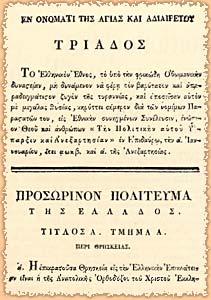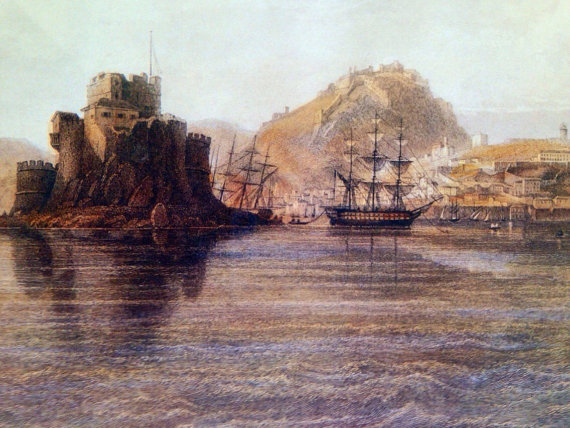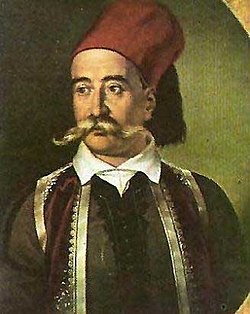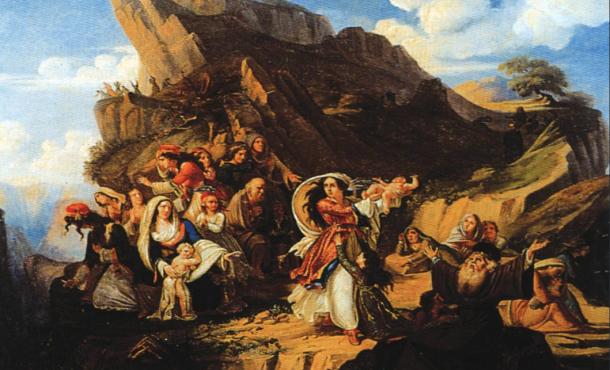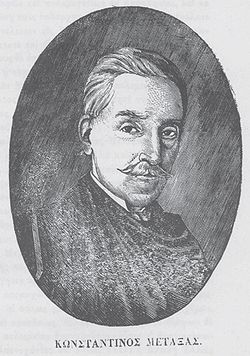Chapter 8: The Assembly of Nafplion
The Constitution of Epidauros
During the early months of 1823, a curious event took place across war torn Greece. Elections were held for the first time to elect representatives for the Second National Assembly where over 250 delegates would gather to revise the Greek Constitution. The current constitution of Greece, the Provisional Constitution of Epidauros, had been written by 59 delegates at the National Assembly of Epidauros during the opening days of January 1822. Declaring the independence of Greece from the Ottoman Empire and establishing Greece as the “Hellenic Republic”, the Constitution of Epidauros detailed a vast array of political institutions that were to be implemented in Free Greece.
[1]
Among other things the Constitution established voting rights for Greek men above the age of 30. The Greek Orthodox Church was established as the preeminent and official religion of Greece and would form the basis of civil rights for the Greek people. There was to be equality before the law for all Greek citizens, the security of property was to be established across Greece, and finally, the tenant of no taxation without proper legalization was enshrined in the document. Most importantly, the Constitution created and defined the three separate but equal branches of the government, a Legislature, an Executive, and a Judiciary.
The Legislative Branch, or Hellenic Senate, was a legislative body of 70 elected representatives from the provinces of Greece each serving a one year term. Their powers and responsibilities included the power to write, vote on and pass legislation for the State of Greece, declare wars, make peace treaties, and create a budget for the state. The Executive was to be a 5-person body whose members were to be appointed by the Assembly with each member serving a 1 year term. The Executive would be responsible for running the government, appointing ministers to the various departments of government, and most importantly it would control the military and conduct the war effort. Finally, the Judiciary would be an institution independent of the Senate and Executive, and would provide judicial oversight of the laws in Greece. Until the time a new legal code could be written for the state, Byzantine law would be the dominant legal code of Greece in all matters except commercial, where French law would take precedence.
The Constitution of Epidauros was in many ways meant to be a temporary solution for the many political and economic problems facing the people of Greece. The delegates had the foresight to include one last clause in the document, scheduling a second assembly in one year’s time which would revise many of the faults found within the document and by the beginning of 1823, it had become abundantly clear that it was in desperate need of attention. While the members of the Senate, were supposed to be elected by the people of the Provinces, the ongoing war disrupted that effort and in many cases the local Primates elected themselves due to their wealth and influence. The Judiciary had not been established in any definitive manner and in its absence local magnates took the law into their own hands to the displeasure of the people. The Senate and Executive were constantly prone to infighting over the scope and scale of their powers especially when it came to financing and directing the war.
So, it was that the final clause of the Provisional Constitution of Epidauros was invoked on the 15th of March 1823 calling for a new National Assembly to be held at Nafplion to amend the text. Nafplion had been chosen as the site for a variety of reasons, firstly Tripolitsa was dealing with a terrible plague which ravaged the city and its hinterland, any site in Rumelia was too close to the front for an event of this importance to take place, and the Moreots and Rumeliotes explicitly refused to venture to the islands for the Assembly. So it was decided that Nafplion would host the event due to its strong defensive fortifications, its central location and ease of access for many of the delegate. It also held a significant symbolic importance to the Greeks having just recently being liberated from the Ottomans. Demetrios Ypsilantis, as commandant of the city following the capture of the castles Palamidi and Akronafplion, acquiesced to the Government’s request, effectively making the city the capital of Greece, a matter that was quickly made de jure in the opening days of the Assembly in a near unanimous vote.
[2]
Nafplion, Capital of the Hellenic Republic and site of the Second National Assembly
After the introduction of delegates and the exchange of platitudes, the Assembly elected the Maniot, Petros “Petrobey” Mavromichalis as President of the Assembly.
[3] Turning their attention to the main topic of debate at the Assembly, amending the constitution, Mavromichalis appointed Alexandros Mavrokordatos with the task of revising the document. As a skilled orator and diplomat, Mavrokordatos was in many ways the perfect candidate for the job and after several days Mavrokordatos and his committee revealed their amended constitution. The Constitution of Nafplion would retain many of the same principles of the prior Constitution of Epidauros, but there were several distinct differences between the two namely:
· The members of the Executive shall be appointed by the Senate.
· The extent of the Executive’s veto power is to be reduced from those of an absolute veto to those of a suspending veto.
· The office of Foreign Minister is to be dissolved and its duties and responsibilities absorbed into the Executive.
· The office of War Minister shall be expanded into a three-member Committee of War.
· The Freedoms and Privileges of the Press are to be protected throughout all the lands of Greece.
· The institution of slavery is to be henceforth abolished throughout all the lands of Greece.
· Voting rights are to be expanded to Greek Men no less than 25 years of age, down from the previously established minimum age of 30 years of age.
These amendments were generally acceptable to the assembly and were quickly adopted by relatively large margins. This unity would not last as two additional resolutions of great contention came to the fore following these revisions. Up to this point Greece was more of a patchwork of disparate communities working together in a loose alliance, an alliance that could be broken at any time, rather than a centralized state that was united in perpetuity.
[4] To rectify this, several members within the Assembly put forth a measure calling for the establishment of 60 districts, from the mainland to the Aegean Islands, with each under the control of a Government appointed official. Politics created strange bedfellows, however, as this measure was ultimately rejected by the combined representatives of Hydra, Spetses, and the Morea. Their opposition was derived primarily from the fact that the measure would provide them even less autonomy than what they had enjoyed under the Turk, autonomy they refused to surrender.
The only matter that the islanders agreed to budge on was the abolition of the regional legislatures. As they held a strong grip on the Hellenic Senate, the delegates of Islanders, chiefly Hydra and Spetses, proved amenable to stripping the mainlanders of their regional senates. Despite the vigorous opposition of the Moreots they lacked a figure with which to rally around resulting in a boisterous but incoherent opposition. Ultimately, they were overruled by the rest of the assembly and the measure was passed by a narrow margin, abolishing the Senate of the Morea, the Western Rumelian Senate, and the Eastern Rumelian Senate.
The second proposal dealt with the raising of money through the sale of vacant Turkish property. Though this measure was promoted to finance the war effort, it was a coalition of military captains from the Morea and Rumelia which opposed the bill. Believing it to be a scheme to further enrich the Primates at the expense of the people, they threatened mutiny unless the measure was shelved. Taking a different course, the property was proposed as collateral for foreign loans, and despite the continued resistance of the Captains, this new measure passed by a healthy margin.
The last item up for debate at the National Assembly of Nafplion were the elections for the new Executive and Senate Presidency. When it came to the nomination of a new President of the Executive, Alexandros Mavrokordatos declined a second term as President of the Hellenic Republic, and was instead appointed to serve as General Secretary of the Executive, while Petros Mavromichalis would be elected President of the Executive in his stead. The Presidency of the Senate was granted to Ioannis Orlandos, a minor merchant from Hydra and brother in law of the wealthy and powerful merchant Georgios Kountouriotis. To mollify the angered Moreots over their reduced autonomy, the Executive was primarily stocked with Moreots and Islanders owing to their great influence over the assembly, with Andreas Zaimis, Sotiris Charalamvis, Ioannis Kolettis, and Panayiotis Botasis rounding it out.
[5] By the end of the Second National Assembly on the 15th of April, the only major office left unfilled was that of Commander in Chief, which had remained vacant since Theodoros Kolokotronis’ death in December.
Petros “Petrobey” Mavromichalis, 2nd President of the Hellenic Republic (Left) and Ioannis Orlandos, 2nd President of the Hellenic Senate (Right)
The office had been created specifically for Theodoros Kolokotronis in the lead up to Dervenakia, and many of his former friends and supporters desired to have the rank retired in honor of his service to Greece. Others wanted to fill the position themselves or with a candidate of their liking.
[6] Ultimately, it fell to Demetrios Ypsilantis. Ypsilantis for better or worse was a man of influence in the Assembly. His wealth, education, and background demanded attention and his efforts thus far had been commendable. The castles of Palamidi and Akronafplion, which overlooked the grounds upon which the assemble met provided a constant reminder to the delegates of his achievement in securing Nafplion where even Theodoros Kolokotronis had failed.
The main motivation for his candidacy, however, was politics. Demetrios had thus far been a prominent supporter of the civilian government and its control over the military which made him amenable to the Primates in the Assembly. He was also well respected by many officers and Captains at the Assembly as he lived among them and worked alongside them as an equal. Most importantly, he was an outsider, as a Phanariot, he had been shielded from the intricate feuds and heated rivalries between the various parties at the Assembly. It was no secret that groups and individuals in attendance at Nafplion were distrusting of each other at best and downright hostile towards one another at worst. Recognized as an impartial adjudicator and a neutral actor in the party politics, Ypsilantis represented a moderate solution for many at the Assembly who sought merely to prevent their rivals from taking the position for themselves. With a consensus built, Demetrios arose as a compromise candidate for the office of Commander in Chief of the Greek Military.
Ypsilantis would quickly find that his office was largely toothless. As Commander in Chief of the Greek Military he was officially responsible for the organization and execution of the war effort under the purview of the Executive’s Committee of War. The government, however, provided him with little support or direction as petty infighting continued to gridlock the Senate and Executive over the coming months. The Committee frequently interfered with Ypsilantis’ stratagems, limiting his offensive and defensive capabilities, and the Senate strictly regulated his resources, limiting what men and supplies he could draw upon. Whatever funding that had been allocated for the purchase of arms or the raising of armies was instead wasted on corrupt policies and individuals that did little more than line the pockets of their benefactors.
Demetrios also found himself in charge of an army which no longer existed in any meaningful form, as the regular army had been all but abolished due to rising expenses and diminishing returns. While a few units still existed, they accounted for less than 1,500 soldiers spread out across all of Greece. The irregulars, the klephts and the militias who had provided the bulk of the Greek manpower thus far in the war, openly refused to obey his commands as their loyalty remained first and foremost with their captains and their kin. The only troops which actively listened to him were the Philhellenes that had journeyed to Greece and the soldiers paid from his own pockets, an act which would nearly bankrupt him. Even still, he managed to dispatch some trusted supporters to the various fronts in Greece, from Missolonghi to Corinth, to assist in the efforts there and hopefully rein in the more autonomous commanders.
One last insult was that his appoint to his office was prerequisite on his surrendering of Palamidi to the Government, an act which rendered him completely impotent politically and susceptible to replacement. The retention of his position would be based solely upon his results and the favor of the Government. So, it was that Demetrios Ypsilantis was cast adrift as the head of a military that barely existed and the leader of men who hardly obeyed him.
Next Time: Karpenisi
[1] While Greece was established as a Republic at the Assembly of Epidauros, there was a general concern among the delegates that this would deter foreign support, which they desperately needed. As a result, they left the door open to a monarchy being established in Greece after the war was concluded.
[2] When the Second National Assembly was being organized, the Government asked Theodoros Kolokotronis permission to have it set in Nafplion. Theodoros refused, believing it was a ploy by his rivals to seize the city from him. Eventually, when the Greek Government forced Theodoros out of Nafplion during the First Greek Civil War in 1823, they immediately designated the city as the capital of Greece, so I see no reason why they wouldn’t do so here as well especially without Theodoros’ resistance.
[3] Petros Mavromichalis was an interesting character. Petrobey was the Bey of the Mani Peninsula, an autonomous or semi-independent region of the Morea with a long history of unrest against the Ottoman Empire. When Alexander Ypsilantis sparked the rebellion in the Danubian Principalities it was Petros Mavromichalis who started the war in the Morea by attacking the Ottoman garrison at Kalamata. After that his role in the war was relatively limited until the Second National Assembly in Astros in OTL where he was elected President of the Assembly.
[4] The government of Greece during the war of independence was akin to the United States under the Articles of Confederation. The Central Government was incredibly weak with no real authority over the many islands, cities, and regions of Greece. Establishing this authority was incredibly difficult in OTL and it will still be difficult even in this timeline.
[5] The makeup of the Executive is a combination of the 1823 and 1824 Members. The Executive that was formed in the Second National Assembly was entirely comprised of Theodoros Kolokotronis and his supporters, Petros Mavromichalis, Sotiris Charalamvis, Konstantinos Metaxas, and Andreas Zaimis. With him dead, there is no need to mollify Theodoros in this manner, resulting in a more balanced Executive like the 1822 one. Lastly, no one cares about the concerns or interests of the Roumeliotes which is the same as OTL.
[6] In OTL it was actually Kolokotronis’ opponents who had the office of Commander in Chief abolished to rein in the Old Man. With his death, the rationale behind that decision has been reversed from an attempt to weaken him to an attempt to honor him, if somewhat begrudgingly.
